Obesity Intervention
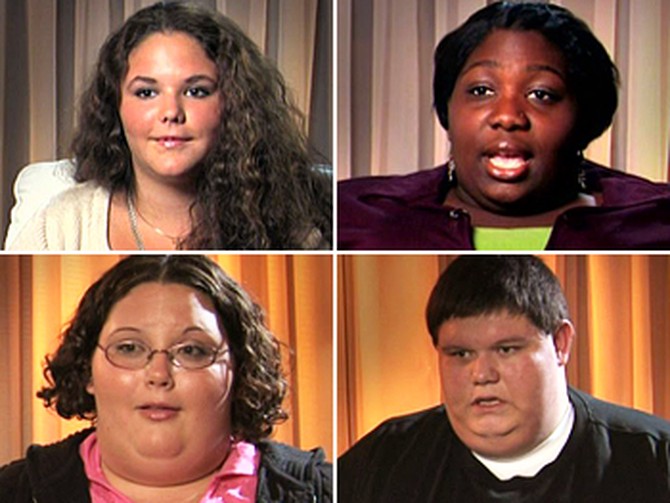
There is an epidemic affecting the health of America's children. It isn't smoking or drug abuse—it's obesity. "This could be the first generation of children to not outlive their parents," Oprah says. Sixteen teenagers share their struggles with weight in hopes of finding the cause. "We wanted to challenge them to take part in a grueling eight-hour intervention where they confront the reasons why they're overweight," Oprah says. "As you hear from them, you'll understand how they got here goes way beyond junk food."
Jessica is 14 years old and has gained 30 to 40 pounds in the past year. "I'm upset about my weight, and I want to do something about it," Jessica says. "I'm sad that I can't accept myself the way I am."
Raven isn't happy with her body and says she gets teased even though people don't know what else is happening in her life. "My mom had brain surgery in December a week before my birthday, and it's kind of stressful because I have to take more responsibilities now," she says.
Christian notices all the thin girls in her school who have boyfriends and seem popular. "Why can't I be like them? Why can't I have a boyfriend like they can?" she says. "Why can't somebody see my inner beauty and not pay attention to my outside?"
Nick weighs 385 pounds and finds it difficult to talk to anyone about his struggle. "When my dad looks at me, I know he just gets depressed because I'm overweight," he says. "I know he feels that it's his fault."
Jillian says that she doesn't remember herself not overweight and is thinking about having gastric bypass surgery. "It's a risky surgery, but there's a chance that I'm going to die from being overweight too," she says.
Stephanie L. is in her senior year and won't go to dances because she's embarrassed about her weight. "School basically is pretty much hell," Stephanie says. "I mean, a lot of kids make fun of me. I'm used to it by now, but it still hurts. No matter how used to it you are, it always hurts."
Josh isn't sure how much he weighs because the scale only goes up to 350 pounds. He believes he eats so much because of his relationship with his father. "That's the reason why I eat so much," Josh says. "He's disappointed in me because I didn't turn out like he wanted me to."
Jessica is 14 years old and has gained 30 to 40 pounds in the past year. "I'm upset about my weight, and I want to do something about it," Jessica says. "I'm sad that I can't accept myself the way I am."
Raven isn't happy with her body and says she gets teased even though people don't know what else is happening in her life. "My mom had brain surgery in December a week before my birthday, and it's kind of stressful because I have to take more responsibilities now," she says.
Christian notices all the thin girls in her school who have boyfriends and seem popular. "Why can't I be like them? Why can't I have a boyfriend like they can?" she says. "Why can't somebody see my inner beauty and not pay attention to my outside?"
Nick weighs 385 pounds and finds it difficult to talk to anyone about his struggle. "When my dad looks at me, I know he just gets depressed because I'm overweight," he says. "I know he feels that it's his fault."
Jillian says that she doesn't remember herself not overweight and is thinking about having gastric bypass surgery. "It's a risky surgery, but there's a chance that I'm going to die from being overweight too," she says.
Stephanie L. is in her senior year and won't go to dances because she's embarrassed about her weight. "School basically is pretty much hell," Stephanie says. "I mean, a lot of kids make fun of me. I'm used to it by now, but it still hurts. No matter how used to it you are, it always hurts."
Josh isn't sure how much he weighs because the scale only goes up to 350 pounds. He believes he eats so much because of his relationship with his father. "That's the reason why I eat so much," Josh says. "He's disappointed in me because I didn't turn out like he wanted me to."

Oprah has struggled with weight for much of her adult life and can't imagine what it's like for overweight teenagers in today's society. "These 16 brave young people you see right here have all agreed to step forward and expose the most painful parts of their lives," Oprah says. "Many for the first time."
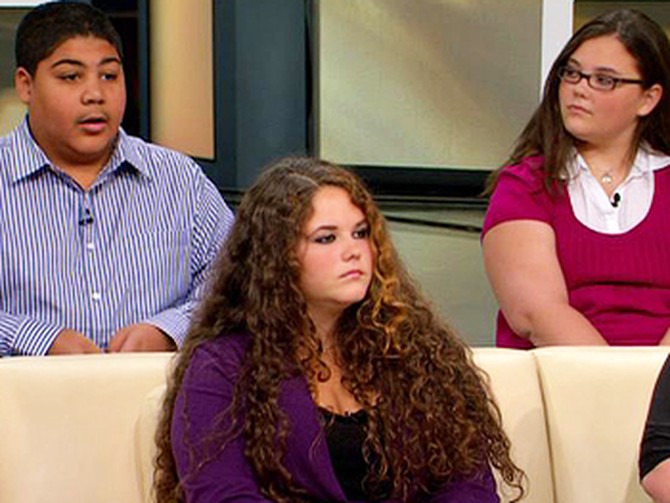
Most of the teens have experienced teasing and ridicule because of their weight and worry about what their peers are saying about them behind their back. "People look at my outer layers," Christian says. "And not my inner beauty and don't recognize what's on my inside and automatically judge me because of my weight."
Jessica says she knows that people talk about her behind her back because of what happened to her after a party she attended. Jessica's best friend posted a photo from a party on the Internet, and a girl posted a nasty comment about her. Jessica's friend refused to take the photo down or even remove the comment from the website. "The other girl, she didn't even really know me. So I don't know why she would make a comment like that," Jessica says. "There was no reason for it. No need for it."
When Jillian is out in public, she worries that people are judging her if they see her eating something. "It's just you're constantly thinking you're just not as good as anyone else," she says. "There are days when I won't eat anything because I just feel like I don't deserve to eat anything."
Stephanie L. uses food to comfort herself when she feels stressed or is frustrated. "When I eat," she says, "it makes me feel calmer and it's like a never-ending cycle of emotions and food and comfort."
Jessica says she knows that people talk about her behind her back because of what happened to her after a party she attended. Jessica's best friend posted a photo from a party on the Internet, and a girl posted a nasty comment about her. Jessica's friend refused to take the photo down or even remove the comment from the website. "The other girl, she didn't even really know me. So I don't know why she would make a comment like that," Jessica says. "There was no reason for it. No need for it."
When Jillian is out in public, she worries that people are judging her if they see her eating something. "It's just you're constantly thinking you're just not as good as anyone else," she says. "There are days when I won't eat anything because I just feel like I don't deserve to eat anything."
Stephanie L. uses food to comfort herself when she feels stressed or is frustrated. "When I eat," she says, "it makes me feel calmer and it's like a never-ending cycle of emotions and food and comfort."

In hopes of helping these teens and their families, counselors Yvonne and Rich Dutra St. John will lead them all in a groundbreaking workshop to uncover the truth behind their struggles with weight. The first time Rich and Yvonne were on The Oprah Winfrey Show, they introduced us to their High School Challenge Day. "It was such a powerful tool for change that we wanted to bring them back to work with these overweight teens who are in crisis," Oprah says.
"Today what we are intentionally doing is inviting a conversation around food, around weight, about the emotions behind the weight—because it's not about our weight," Yvonne says. "It's 'What is the hunger for? What are we hungry for?'"
Rich explains that the goal for the workshop is always about bringing people together. "But here it was [also] to make a safe place for all these young people to be able to tell the truth about what's going on in their life and what's behind the eating," he says.
"Today what we are intentionally doing is inviting a conversation around food, around weight, about the emotions behind the weight—because it's not about our weight," Yvonne says. "It's 'What is the hunger for? What are we hungry for?'"
Rich explains that the goal for the workshop is always about bringing people together. "But here it was [also] to make a safe place for all these young people to be able to tell the truth about what's going on in their life and what's behind the eating," he says.

The first exercise of the day was to split up the room, parents and siblings on one side and the teens on the other. "The goal was to show both sides that they're not alone in this battle," Oprah says.
Once the room is divided, Yvonne asks the teens to stand if they had ever been laughed at, teased or physically assaulted because of their weight or body size. Some of the teens stand. "My brother makes fun of me," Haven says. "He calls me Barney. He calls me Chubs. He calls me a fatty."
Jillian says people in her school post negative comments on the Internet about their overweight classmates. "How gross they are and if you're overweight, you should die...and it's just really hard," she says.
When Yvonne asks the teenagers to stand if they have ever felt ashamed or embarrassed about the way they look, most of the teens stand. "It's rare that I don't go in my room and cry at night," Jessica says. "It's usually when I start trying to get my clothes ready for school in the morning and the stuff will fit, but it's putting it on and knowing what size it is."
Once the room is divided, Yvonne asks the teens to stand if they had ever been laughed at, teased or physically assaulted because of their weight or body size. Some of the teens stand. "My brother makes fun of me," Haven says. "He calls me Barney. He calls me Chubs. He calls me a fatty."
Jillian says people in her school post negative comments on the Internet about their overweight classmates. "How gross they are and if you're overweight, you should die...and it's just really hard," she says.
When Yvonne asks the teenagers to stand if they have ever felt ashamed or embarrassed about the way they look, most of the teens stand. "It's rare that I don't go in my room and cry at night," Jessica says. "It's usually when I start trying to get my clothes ready for school in the morning and the stuff will fit, but it's putting it on and knowing what size it is."
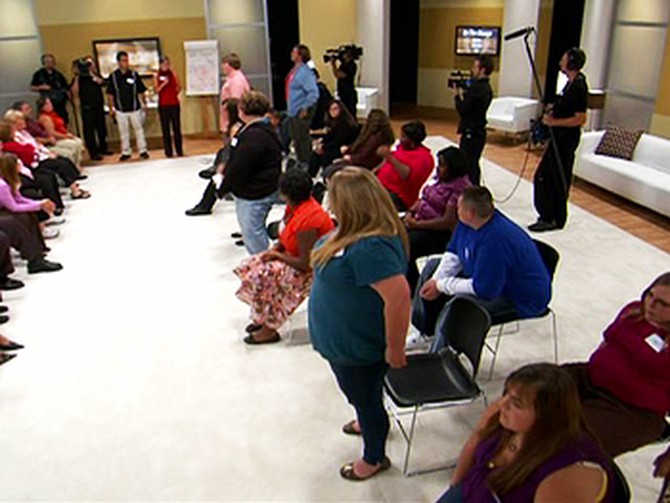
Rich asks the teens' family members to stand if they are worried about their child's health, life or future. They have good reason to be worried. Stephanie L. says she has had type 2 diabetes for two years.
But the response to the next question is truly chilling. "Teens, please stand if you've ever seriously considered or attempted suicide," Yvonne asks. Many do.
Tyler says he is one of those who have. "I keep thinking, 'If I'm gone, how would they feel—better or not?'" he says.
Yvonne says she is not at all surprised by the reaction to that question. "I expected it. I was overweight as a teenager too," she says. "Being teased all the time and I was suicidal and felt depressed all the time, so that wasn't a surprise."
The goal of this exercise, Yvonne says, is to show the teens that they are not alone and put them in touch with their emotions. "It's an opportunity to be able to wake up," she says. "One of the biggest goals is to give them tools to help them get the feelings out instead of trying to numb them out through food."
But the response to the next question is truly chilling. "Teens, please stand if you've ever seriously considered or attempted suicide," Yvonne asks. Many do.
Tyler says he is one of those who have. "I keep thinking, 'If I'm gone, how would they feel—better or not?'" he says.
Yvonne says she is not at all surprised by the reaction to that question. "I expected it. I was overweight as a teenager too," she says. "Being teased all the time and I was suicidal and felt depressed all the time, so that wasn't a surprise."
The goal of this exercise, Yvonne says, is to show the teens that they are not alone and put them in touch with their emotions. "It's an opportunity to be able to wake up," she says. "One of the biggest goals is to give them tools to help them get the feelings out instead of trying to numb them out through food."
Keep Reading

Rich and Yvonne's next revealing exercise starts by finishing the statement, "If you really knew me..."
"If you really knew me, you'd know that I hate myself and everything about me," Jillian says. "And if you really knew me, you'd know that when I come home from school, I go in my room and I go to sleep because I'd rather be sleeping than awake because I hate my life and everything about me."
Jillian's mom, Nancy, goes next. "If you really knew me, you'd know how much it breaks my heart when my girls go to school and they come home and they don't want to go anywhere or do anything. They just want to go to their rooms. I try to hide the pain that they're having just by giving them more and more and more and more. Trying to make them happy."
"If you really knew me, you'd know that I hate myself and everything about me," Jillian says. "And if you really knew me, you'd know that when I come home from school, I go in my room and I go to sleep because I'd rather be sleeping than awake because I hate my life and everything about me."
Jillian's mom, Nancy, goes next. "If you really knew me, you'd know how much it breaks my heart when my girls go to school and they come home and they don't want to go anywhere or do anything. They just want to go to their rooms. I try to hide the pain that they're having just by giving them more and more and more and more. Trying to make them happy."

Raven and her mother, Julie, go next.
"If you really knew me, you'd know I was diagnosed with a brain tumor and I know that has to be a burden on these kids," Julie says.
"If you really knew me, I've had to grow up a lot over the past year with my mom being sick," Raven says. "That's kind of like a touchy subject for me to talk about because it's kind of hard because you wake up every day and you worry and think, 'Oh my God, is she going to be all right today? Is she going to have a seizure today?' And it's kind of hard having to be strong and try to help out and take on more responsibility and try to do all these things."
"If you really knew me, you'd know I was diagnosed with a brain tumor and I know that has to be a burden on these kids," Julie says.
"If you really knew me, I've had to grow up a lot over the past year with my mom being sick," Raven says. "That's kind of like a touchy subject for me to talk about because it's kind of hard because you wake up every day and you worry and think, 'Oh my God, is she going to be all right today? Is she going to have a seizure today?' And it's kind of hard having to be strong and try to help out and take on more responsibility and try to do all these things."

Next are Nick and his father, James.
"If you really knew me, you'd know I've been overweight ever since I can remember," Nick says. "I had an asthma attack on the court playing basketball in a tournament and after that, my basketball coach cut me because I was a health risk. Since I got cut, I didn't have anything to fill that gap of time that I had on my hands, so I just kind of sat around and ate all day."
James goes next. "If you really knew me, you'd know that it really hurts me to see him struggle. It makes me feel like I'm a failure," he says. "Being a single dad, you try to balance work and you try to be there for your kids, and it's been more about being at work trying to make ends meet than being there for him. It should have never gotten to this point."
James says the session with Rich and Yvonne has changed his relationship with Nick for good. "A lot of things that had been hidden, been kept down. You just go through everyday life and just try to make ends meet. You think it's not a problem—you're going to address it tomorrow—and before you know it, he's grown," he says. "I feel like this whole process that we went through brought my son and I closer together."
"If you really knew me, you'd know I've been overweight ever since I can remember," Nick says. "I had an asthma attack on the court playing basketball in a tournament and after that, my basketball coach cut me because I was a health risk. Since I got cut, I didn't have anything to fill that gap of time that I had on my hands, so I just kind of sat around and ate all day."
James goes next. "If you really knew me, you'd know that it really hurts me to see him struggle. It makes me feel like I'm a failure," he says. "Being a single dad, you try to balance work and you try to be there for your kids, and it's been more about being at work trying to make ends meet than being there for him. It should have never gotten to this point."
James says the session with Rich and Yvonne has changed his relationship with Nick for good. "A lot of things that had been hidden, been kept down. You just go through everyday life and just try to make ends meet. You think it's not a problem—you're going to address it tomorrow—and before you know it, he's grown," he says. "I feel like this whole process that we went through brought my son and I closer together."

When it was Josh's turn to do the "If you knew me..." exercise, his parents, Ann and Andy, went first. "If you really knew me, you'd know that my biggest fear is that my children will follow my path of my drug addiction," she says. "One of the things I really want the most is for all my children just to be happy."
"If you really knew me, you'd know that I'm sort of rough on my kids," Andy says. "I'm sort of a perfectionist. I want stuff done a certain way, and I expect it to be done a certain way. That's why I'm hard on them. I'm sure they hate me most of the time."
Then it's Josh's turn. "If you really knew me, you'd know as a kid I've gotten my fair share of beatings from both my parents. My dad does have these high standards, and if we can't reach them, he's disappointed with us and he gets angry," he says. "I try to do better, but it just doesn't seem like it's working. And when I'm sad, I'll eat, and I think I've been sad most of my life because I've been big most of my life."
Josh says after this emotional moment for his family, life at home has changed somewhat. "Things got a little better. There hasn't been a whole lot of yelling," he says. "But they're still the same way. Everything's still the same."
As Josh was getting heavier and heavier, Andy says he never spoke with him about what was going on. "I didn't know what to do," he says. "I just didn't know what to do."
But Andy says seeing Josh discuss his feelings about his weight and his parents was eye-opening. "We're trying to get the help and so on," he says.
"If you really knew me, you'd know that I'm sort of rough on my kids," Andy says. "I'm sort of a perfectionist. I want stuff done a certain way, and I expect it to be done a certain way. That's why I'm hard on them. I'm sure they hate me most of the time."
Then it's Josh's turn. "If you really knew me, you'd know as a kid I've gotten my fair share of beatings from both my parents. My dad does have these high standards, and if we can't reach them, he's disappointed with us and he gets angry," he says. "I try to do better, but it just doesn't seem like it's working. And when I'm sad, I'll eat, and I think I've been sad most of my life because I've been big most of my life."
Josh says after this emotional moment for his family, life at home has changed somewhat. "Things got a little better. There hasn't been a whole lot of yelling," he says. "But they're still the same way. Everything's still the same."
As Josh was getting heavier and heavier, Andy says he never spoke with him about what was going on. "I didn't know what to do," he says. "I just didn't know what to do."
But Andy says seeing Josh discuss his feelings about his weight and his parents was eye-opening. "We're trying to get the help and so on," he says.
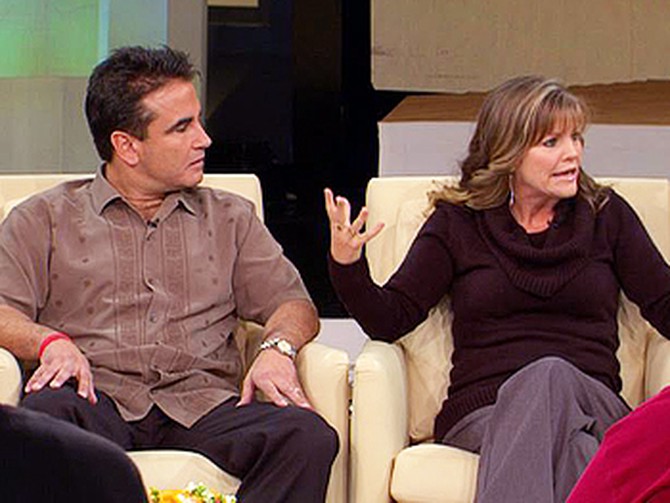
Many obese teens use their weight as a shield to hide their true feelings—and Rich says this often causes them to act in ways they normally wouldn't. "They get funny. They try to go along with the crowd and let the jokes happen to them. They may get angry and act like they don't care," he says. "There's all sorts of different reactions depending on the kid and the situation, but it's always a role."
Between assuming roles, coping with broken families or sick parents and other stresses, Yvonne says today's teens are taking on a lot—and they're angry. Before anyone can start working on larger health issues, Yvonne says you must tap into a place she calls the "inner balloon"—a place inside where people hide the feelings they can't express. "Anger is one of the least socially accepted emotions. And when these balloons get bigger, it's one of the ones that often leaks out onto other people and hurts other people," she says. "That anger, if it's not expressed, it goes inside the body and we start to eat it or try to numb it out."
In order to start healing—no matter your weight—it's essential to confront that anger head on. Yvonne recalls a time her teenage daughter came home extremely upset. Yvonne asked her to come into a quiet room with her. To find out what her anger was really about, Yvonne asked her to complete this sentence: "I'm angry that..."
"So she looked at me and she said, 'I'm angry at you because you're always gone,'" Yvonne says.
Yvonne says her first reaction was to defend herself, but she held back instead. "So I said to her—and I think these are the two most powerful words we can ever say—I just said, 'What else?'"
Yvonne's daughter then started crying and opened up more about what was bothering her. "I looked at her and I said, 'I'm right here with you, baby. What else?' And she just cried and she screamed. She cried and screamed. It felt like an hour—it was probably 10 minutes," Yvonne says. "And then she [let out a deep breath and said], 'What's for dinner, Mom?'"
The lesson everyone can learn, Yvonne says, is to just be present. "There's no better way to say 'I love you' than just be there," she says. "Anger is often like the cork in the top of the bottle and it keeps everything stuck inside. So if we can get that cork out, it releases our passion, our joy. It gives us energy to make great choices in life."
Between assuming roles, coping with broken families or sick parents and other stresses, Yvonne says today's teens are taking on a lot—and they're angry. Before anyone can start working on larger health issues, Yvonne says you must tap into a place she calls the "inner balloon"—a place inside where people hide the feelings they can't express. "Anger is one of the least socially accepted emotions. And when these balloons get bigger, it's one of the ones that often leaks out onto other people and hurts other people," she says. "That anger, if it's not expressed, it goes inside the body and we start to eat it or try to numb it out."
In order to start healing—no matter your weight—it's essential to confront that anger head on. Yvonne recalls a time her teenage daughter came home extremely upset. Yvonne asked her to come into a quiet room with her. To find out what her anger was really about, Yvonne asked her to complete this sentence: "I'm angry that..."
"So she looked at me and she said, 'I'm angry at you because you're always gone,'" Yvonne says.
Yvonne says her first reaction was to defend herself, but she held back instead. "So I said to her—and I think these are the two most powerful words we can ever say—I just said, 'What else?'"
Yvonne's daughter then started crying and opened up more about what was bothering her. "I looked at her and I said, 'I'm right here with you, baby. What else?' And she just cried and she screamed. She cried and screamed. It felt like an hour—it was probably 10 minutes," Yvonne says. "And then she [let out a deep breath and said], 'What's for dinner, Mom?'"
The lesson everyone can learn, Yvonne says, is to just be present. "There's no better way to say 'I love you' than just be there," she says. "Anger is often like the cork in the top of the bottle and it keeps everything stuck inside. So if we can get that cork out, it releases our passion, our joy. It gives us energy to make great choices in life."

To help this group of teenagers express their inner anger, Yvonne and Rich had them complete the "I'm angry that..." exercise. Jillian is the first to bravely share her feelings. "You cannot do this wrong," Yvonne says.
With her parents, Nancy and Matthew, sitting nearby, Jillian starts. "I'm angry that I can never be as good as my sister," she says. "I'm angry that I disappoint my dad. I'm angry that I had to have my dad's cousin to make my prom dress. I'm angry that I had to ask someone to prom.
"I'm angry that my mom blames herself for me being overweight. I'm angry that when I see pictures of myself I just want to rip them up," she says. "I'm angry, just angry."
Jillian says the exercise was the turning point of her life. "It is so much easier to just keep that all in and put a smile on and say that nothing bothers you when really it's killing you on the inside," she says.
Nancy says hearing Jillian broke her heart. "She's always had a weight problem ever since she was a little baby, and I always tried to make it better for her or ignored her," she says.
Together, the family is working together to make a positive change in all their lives. Nancy says they've started grocery shopping as a family and want to start exercising together. They've also started communicating more honestly with one another— something Matthew says he never used to do. "Jillian gets frustrated with me because I do that. Sometimes she wants to talk and it's hard for me to open up like that," he says. "It's gotten a lot better since we've gone through this intervention. Jillian and I talked a little bit more."
With her parents, Nancy and Matthew, sitting nearby, Jillian starts. "I'm angry that I can never be as good as my sister," she says. "I'm angry that I disappoint my dad. I'm angry that I had to have my dad's cousin to make my prom dress. I'm angry that I had to ask someone to prom.
"I'm angry that my mom blames herself for me being overweight. I'm angry that when I see pictures of myself I just want to rip them up," she says. "I'm angry, just angry."
Jillian says the exercise was the turning point of her life. "It is so much easier to just keep that all in and put a smile on and say that nothing bothers you when really it's killing you on the inside," she says.
Nancy says hearing Jillian broke her heart. "She's always had a weight problem ever since she was a little baby, and I always tried to make it better for her or ignored her," she says.
Together, the family is working together to make a positive change in all their lives. Nancy says they've started grocery shopping as a family and want to start exercising together. They've also started communicating more honestly with one another— something Matthew says he never used to do. "Jillian gets frustrated with me because I do that. Sometimes she wants to talk and it's hard for me to open up like that," he says. "It's gotten a lot better since we've gone through this intervention. Jillian and I talked a little bit more."
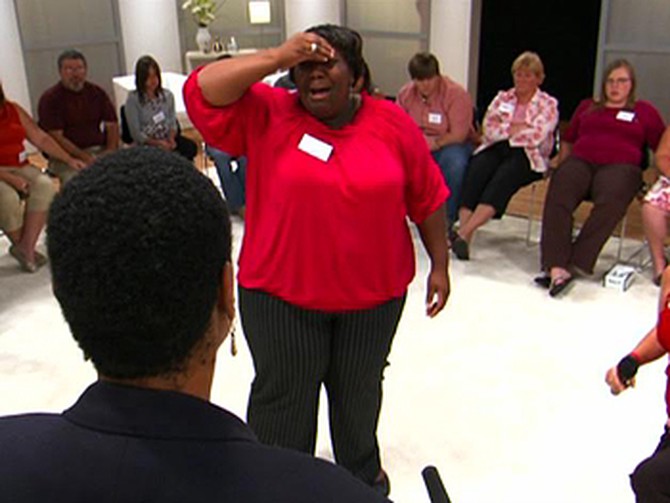
Next up is Christian. Her mother takes the floor across from her. "Let this be like it's rain and it's not going to get stuck in you," Yvonne says.
"I'm angry that you're my best friend—my only best friend," Christian says.
Christian's mother is taken aback and says, "Oh," but Yvonne encourages her to stand strong. "Make whatever sounds you need to make," Yvonne says.
Even in her own anger, Christian works to help heal her mother. "I'm angry because you think [my weight] is your fault. This is not your fault," she says. "I'm angry because it kills your heart that I don't have a father. But it's not your fault."
"I'm angry that you're my best friend—my only best friend," Christian says.
Christian's mother is taken aback and says, "Oh," but Yvonne encourages her to stand strong. "Make whatever sounds you need to make," Yvonne says.
Even in her own anger, Christian works to help heal her mother. "I'm angry because you think [my weight] is your fault. This is not your fault," she says. "I'm angry because it kills your heart that I don't have a father. But it's not your fault."
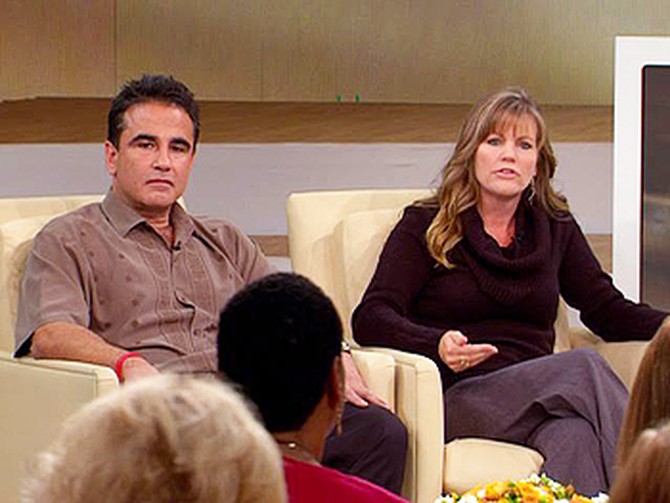
Yvonne urges every family to use these intervention tools to begin their own healing. "One of the best gifts we can give to our children is for us to do our own work, to do our own healing," she says. "Tell the family, 'We're taking care of ourselves.'"
If you or a loved one are struggling with obesity, it's important to realize that food is only a small part of the problem. Ask yourself, "What are you really hungry for?" Then, pay attention to a formula that Rich says is essential to change—notice, choose and act. "Notice what's happening, choose how you'd like it to be and then take action because you can't have the same old story again and get in a victim mentality," he says. "The key is that you do the emotional work you need to do so you feel like you have communication and you can work together, and that can actually put your attention in the same direction."
Looking for the freedom to move on or to help someone else move on? It can often be found in a simple apology. "We do the best we can as parents, but the truth is most of us had more training on how to drive a car than to be parents," Yvonne says. "We're going to make mistakes. The biggest mistake we can make is not admitting we make a mistake. So to go to our kids, and like so many of you did during the challenge day, look our kids in the eye and say, 'You know what? I made a mistake. I'm sorry.' Best gift we can give our kids. And it frees ourselves. It frees us all."
Find resources to conduct an intervention with your family
If you or a loved one are struggling with obesity, it's important to realize that food is only a small part of the problem. Ask yourself, "What are you really hungry for?" Then, pay attention to a formula that Rich says is essential to change—notice, choose and act. "Notice what's happening, choose how you'd like it to be and then take action because you can't have the same old story again and get in a victim mentality," he says. "The key is that you do the emotional work you need to do so you feel like you have communication and you can work together, and that can actually put your attention in the same direction."
Looking for the freedom to move on or to help someone else move on? It can often be found in a simple apology. "We do the best we can as parents, but the truth is most of us had more training on how to drive a car than to be parents," Yvonne says. "We're going to make mistakes. The biggest mistake we can make is not admitting we make a mistake. So to go to our kids, and like so many of you did during the challenge day, look our kids in the eye and say, 'You know what? I made a mistake. I'm sorry.' Best gift we can give our kids. And it frees ourselves. It frees us all."
Find resources to conduct an intervention with your family
Published 01/26/2009
As a reminder, always consult your doctor for medical advice and treatment before starting any program.




